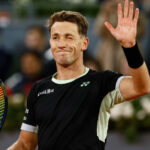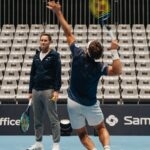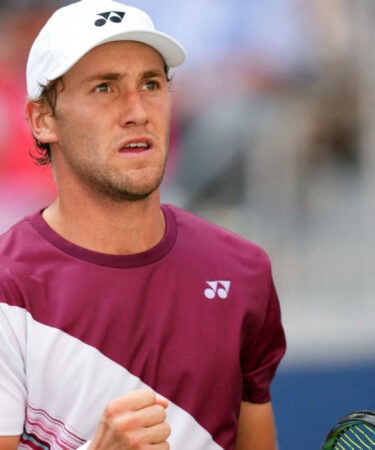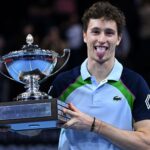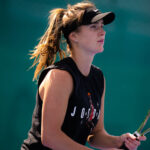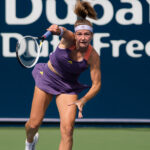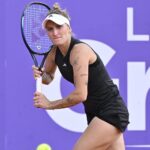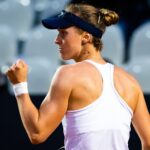Norwegian tennis, UTS and the first time his son beat him: Exclusive Q&A with Christian Ruud (father and coach of Casper Ruud)
Christian Ruud shares about his journey coaching Casper Ruud, and the importance of UTS Oslo for Norway
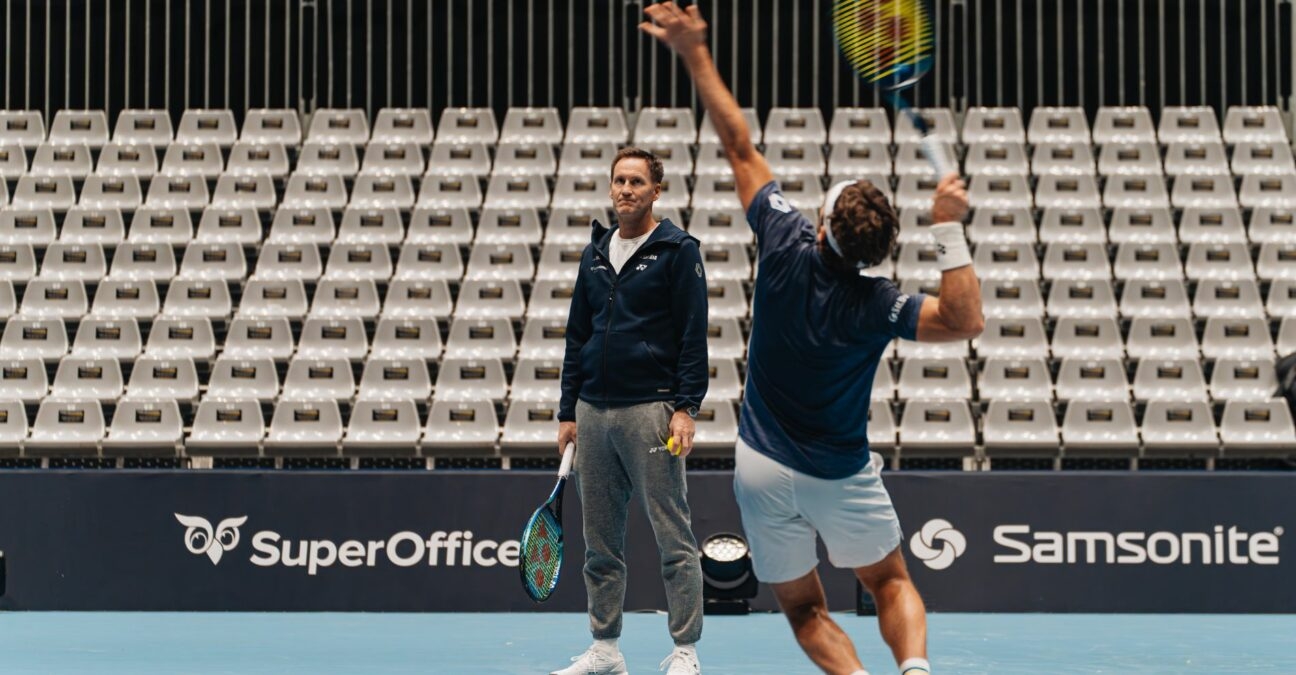 Casper Ruud with his father Christian – UTS Oslo
Casper Ruud with his father Christian – UTS Oslo
Ahead of UTS Oslo, which takes place from 9 to 11 February, Tennis Majors caught up with Christian Ruud. Christian is the father and coach of Casper Ruud and is also a former top 50 ATP player himself.
With UTS Oslo representing one of the largest-ever tennis events held in Norway, we picked Christian’s brain about his journey so far with Casper, the UTS format, and how he thinks his son will fare.
On the ATP Tour, just for people who never saw you play, what was your style of game, your achievements?
Well, I was a typical clay court, baseline player. I was maybe a bit too defensive. I made a lot of balls back. My strength was being consistent, I would believe, I didn’t have a huge serve or a huge weapon, but I was fighting every match and putting a lot of balls back.
If UTS had existed at the time you played, do you think would you have been good at it?
I think maybe I would be pretty good. With one serve, I think I would have an advantage over the big servers, like Ivanisevic and Krajicek and those guys. If it was on clay, I think I would do pretty good.
So UTS is coming to Norway, Oslo next year so we have to talk about it because it's something big for everybody here. First of all, Casper always says that he comes from a small country when it comes to tennis, what does that mean?
It means that tennis is not a big tradition here. We had Sweden with Bjorn Borg, that brought to tennis to Scandinavia in a way, but Norway didn’t follow. We were only big in the winter sports, the cross-country skiing and the alpine skiing, so I think we just didn’t have the tradition and we don’t have a lot of facilities to play in.
Maybe I made the tennis a bit popular in Norway but of course Casper is a lot better than me and he’s brought attention to the tennis in Norway. I think it’s getting more and more popular now every year.
How did you discover tennis yourself and how did you become someone in tennis?
Well, I started maybe a little bit late. I was like 10 years old. My dad just started to play tennis himself, and he enjoyed it. I just went along to the tennis club with him, and you know just started to hit balls and play with friends. I just liked it more than soccer and ice hockey, which I also did at that time, you know, like individual sport suited better for me and I improved a little bit, year by year.
When I was like 15 or 16, I was the best in Norway, and I decided to go professional. So, for me it was a really good sport, and I am happy with my career that I had.
Are you lucky enough to have facilities in your neighbourhood?
Yeah, we do. We have like bubbles, quite good outdoor facilities but the indoor facilities in Norway are not great. It’s a cold country, we have to play a lot indoors. Most of the clubs have bubbles now, the last 10, 15, 20 years you know a few more normal indoor courts with a roof and everything.
It’s getting better, but you know, I think we’re quite far behind Sweden still when it comes to facilities but hopefully that can change in the future.
I think the Norwegian people really feel like it’s interesting to follow some Norwegian stars that are not with skis on their feet
Christian Ruud
And now tennis is more and more popular with Casper reaching the highest level of international tennis, can you just tell us how that feels from your standpoint?
I think that the Norwegian people are very good in sports in general, and we have been dominating winter sports a lot in cross-country [skiing] and alpine [skiing]. I think almost the Norwegian people are a little bit tired of Norway always winning in the cross-country, so I think Casper, Viktor Hovland and some runners are doing really good in the summer sports now.
I think the Norwegian people really feel like it’s interesting to follow some Norwegian stars that are not with skis on their feet, that are doing other sports. I think it’s so, a lot of good media coverage. And I think these young athletes have gotten a lot of attention the last three or four years.
When you walk down the street with Casper in Norway, what is it like? Does everyone look at you, or everybody just leaves you alone?
Well, I think actually Norwegians are quite like humble and leave the stars alone and so I think most people will recognise him, but they don’t necessarily bother him with pictures and autographs all the time. Of course, some people will do that. But in general, they’re quite like humble and they leave the sports stars alone a little bit, so I think it’s not a big issue or problem for Casper actually.
Okay, let's go to the journey with Casper. Most of the tennis players at some point they have to answer the question, if you have a son or daughter will you help him or her to become a tennis player? If the question was asked to you 25 years ago, what would you have answered?
Well, I enjoyed my tennis career. I know it’s tough with travelling, so some things that you don’t really like but when Casper was young, I introduced him to all the sports that you could do in Norway. Basically, it was soccer, it was ice hockey, golf and also of course tennis.
He touched the ball since he was young. I gave him a racquet and I was quite young when I became a father. I enjoyed playing with him, with different kind of sports. And when he was like 10 years old, he said to me that he wanted to have focus on the tennis, you know, that’s where he felt more happy.
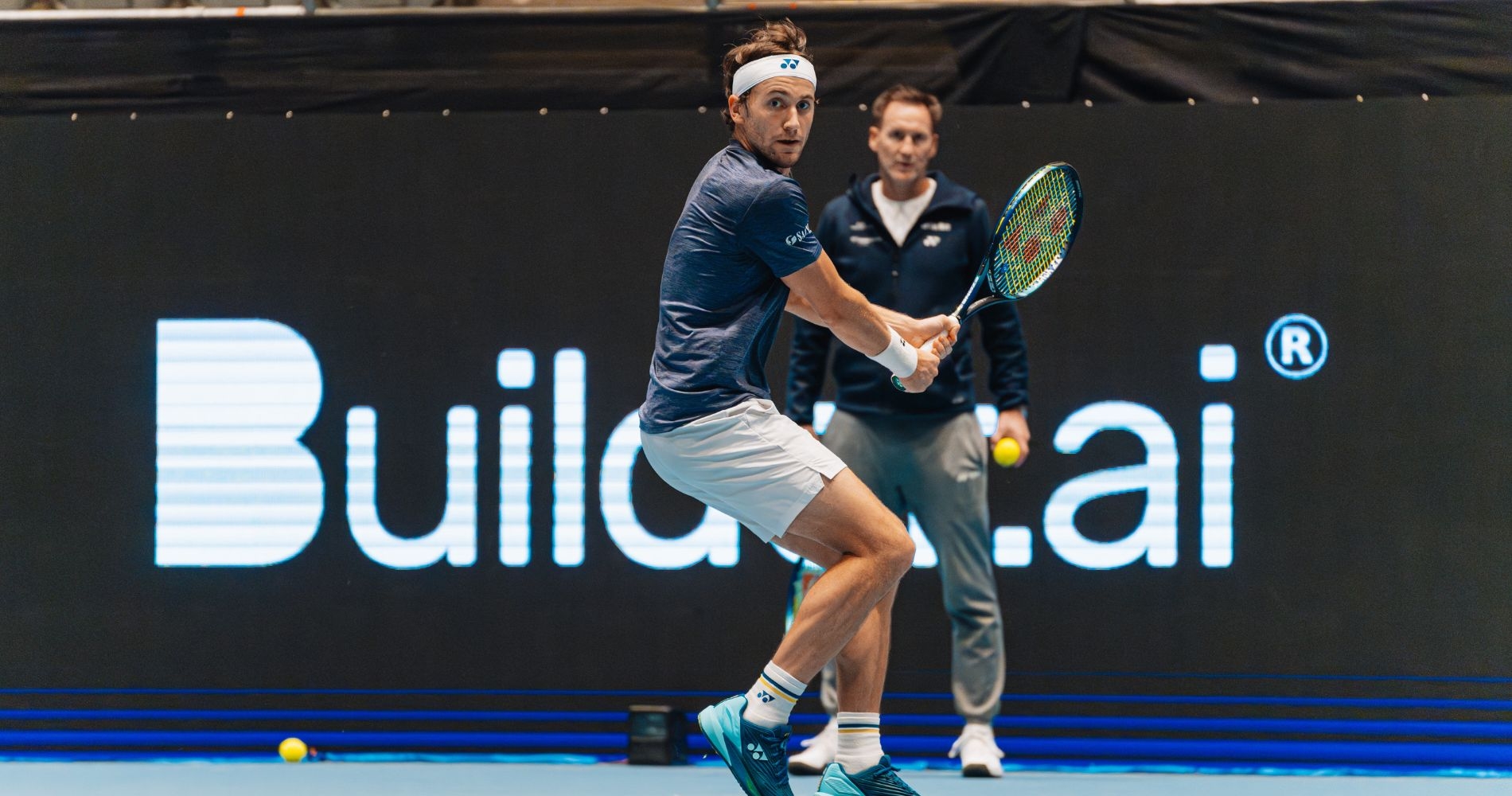
Since then, he’s done a good job and we have been training well and getting good results the last 10, 15 years. He had the chance to do other sports but in the end, he chose tennis and I think he’s happy for that.
Before he was 10, since you know about tennis, did you notice he was better than average?
Not really. I think he was quite talented in especially soccer and also in golf. We didn’t play like serious golf but we did play a lot and he hit ball since he was young. He was talented in all the sports I think and he was a kid that really wanted to do sports, everything with a ball, he wanted to do it.
I could see from a young age that he liked to play with the ball. He had some kind of talent in him and the drive to train well and hard. Every time he played soccer or tennis, he did a good effort so he’s always had that since he was young.
Between when he was 10 and let’s say top 50 what were the key moments of his progression and of your common journey to the highest level?
The key for him to reach the top 50 I think is he was working really hard.
We actually had a very good coach when he was 16 to try and develop him and travel with him and you know, get a feel for how the Spanish people were doing it because we were in Norway, a small country, not too many players. So we had to go a little bit outside to find inspiration and see what other people were doing but I think he was always determined to play in the Grand Slam and try to beat my record, which was No 39.
I think he’s just very professional. When he sets himself a goal I think he works very hard to reach it. I think when he was like 14, 15, he was quite humble and he said if I can reach the top 50 when I’m 26, you know, I feel like I’ve had a good career. Everything went a lot faster than what he was expecting and the goals he set himself. I think he’s just getting paid for the hard work and the dedication he has done for the last you know, 10 years.
And some day he told you he wanted to have a better ranking than yours?
You know, he didn’t really say that because it was all the media in Norway, you know, they knew he was No 1 junior. They were all cheering for him to become a professional, and of course the natural thing was are you going to beat your dad, which was No 39, and there was a lot of media around that, to become better than me.
He reached that goal a lot earlier than what I thought he would do. I think he was I don’t know maybe 19, 20 when he did that. In a way he beat my record quite easy and as you know, he’s been all the way up to No 2 in the world. So yeah, he’s had a good last five, six years, I would say.
You played with him, and he remembers well the first time he beat you. Do you remember?
I remember the day when he first beat me, it was actually in the summer, I think he was just at 14 or 15. And yeah, it’s true. I still feel like I was better than, better than him that day but anyway, I was, I was not playing my best, I think.
It was a competitive match. We said, “Okay, let’s play, play a set.” I think maybe it was just one set. And if I remember right, I think he beat me 6-2 or 6-3. Like I said, at that point, I was still a better player than him. I’m pretty sure about that. But I think maybe I had a bad day and he had a good day.
Of course for him it was very fun to beat me. We were talking about it for a long time. But yeah, after that we didn’t really play that much, the focus was for him to improve and you know, I was getting older and getting worse and he was getting better.
I think we’re just, we are more like, almost like friends than father and son.
Christian Ruud
Things went quicker than you expected with Casper’s career. Can you just help us to understand how you the relationship works, with your son being a top player, and you being the dad, obviously someone very close? How did you make it work?
I think like Norwegians, we are quite calm people, we don’t show too many emotions. So I think first of all, at a pretty young age he had respect for me that I was a player. It’s more difficult for other dads that didn’t play tennis to reach into the mind of their sons. I think I was a little bit lucky that he accepted that I was a player and most of the time I knew what I was talking about. In that sense, it was easier for me to coach my son than maybe other parents.
I think we’re just, we are more like, almost like friends than father and son. He respects, and I know how it is when you lose. I think he respects that I know how it feels. We have the motto that if you try your best every day, we’ll see what happens, and I think that’s like a good thing to have. We lose together and we win together and I think we just try to analyse and move forward with things that aren’t working.
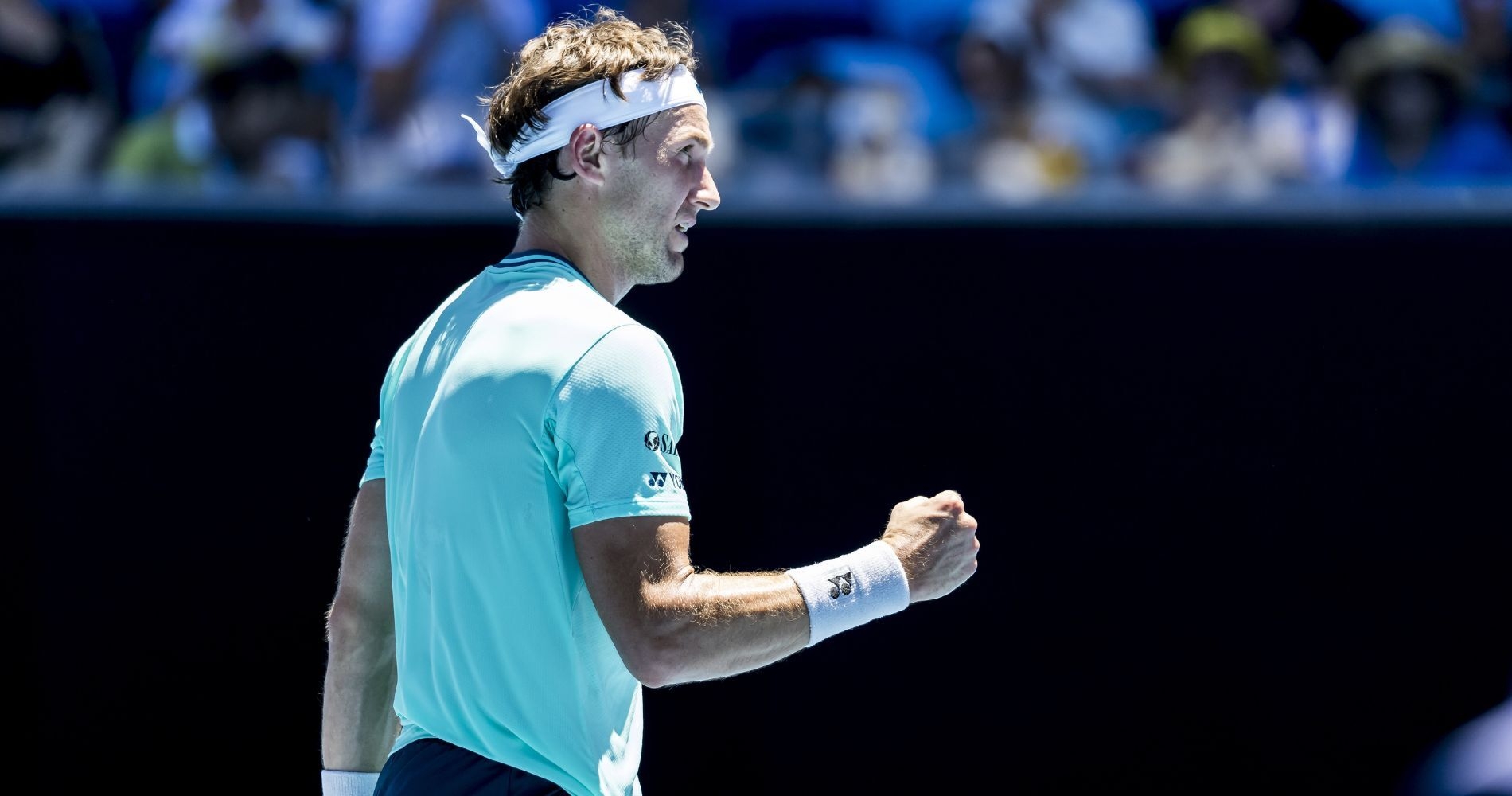
Some parents manage to coach their kids and some cannot. I have two daughters and they have more temperament than Casper, especially my oldest daughter. I tried to train her but that was not easy. So I think every person is different and Casper’s kind of a calm person. I think we fit together as father and son and also like coach and player.
What are the next steps in Casper’s career? He was very close to the top in terms of ranking and Grand Slams last year, so obviously everyone might assume that’s the next goal. Is it the case, or is it not that simple?
I think the tendency is developing all the time, but we have new really good players coming up the whole time. You have to work hard and fight every day and this year [2023] has been a little bit difficult so far, but he has still been in a Grand Slam final and won a title and he’s still in the top 10.
I think ranking goal, it’s more important for Casper to try and win a Grand Slam to say than to say that I’m going to be No 1 in the world. He was one match away in 2022. So it was of course close.
The ultimate goal I think now is to win the Grand Slam since he has been in three finals and I think to stay in the top 10 is obviously something that everyone wants to do. And then of course that’s Casper’s goal also and if you are No 3 or No 6 or No 8 I don’t think it’s such a big difference. But you know, to say that you have won the Grand Slam. I think that would be something really special and I think that’s definitely one of Casper’s goals.
You said you are not very emotional. Even when you beat the greatest player in the world in Grand Slam tournaments?
Yes, of course, I mean, I have emotions of course and Casper has but we maybe don’t show it as much as Italians or the people from south of Europe. But of course we have emotions and you know when we have good results we’re all happy and super happy inside but I don’t know, Norwegians or Scandinavians don’t show it that much. Maybe we’re a little bit different than the south of Europe.
I thought UTS was really interesting to watch and it’s going to be very interesting to see in the future if this concept is going to stay or even grow and become more popular.
Christian Ruud
How do you think UTS Oslo will be received? You told me that Norway was a great sports country, but not a tennis country. And how do you frame the event for you, your family, and people around?
Well, I think it’s going to be the first time Norway will have like superstars or top 10 tennis players competing in an event in Norway. So I’m really curious to see how it’s going to be.
I really like the system. It’s obviously for the young generation that everything is going quick and you have music, you have everything there to have like a good time. It’s very intense and you are even more nervous because you know how much one point here and there can count. In normal matches you can feel you have a little bit more chances.
I thought UTS was really interesting to watch and it’s going to be very interesting to see in the future if this concept is going to stay or even grow and become more popular. Casper played his first event in Frankfurt and I thought it was a really, really good event.
UTS promotes coaches and coaching. That's why coaches are on the court and they can direct whenever they want. What type of coach do you think you will be with Casper on the court?
I will still be kind of calm, but I think I will of course try to push him in the important moments. Maybe with some tactical things I think that I can help him.
I think it’s also very interesting with the three points you can get to do that at the right moment. It’s also very important. I feel like some players always wait to the end but sometimes you can kill the quarter if you use it maybe a little bit earlier and get a bigger lead than to always try to take it at the last moment. I think it’s a fun aspect of the scoring system and I hope I can help him to win matches of course in that format.
I know Casper quite well since I’ve been with him since he was young. Maybe that’s a little bit advantage for me, you know, father son, been coaching him since he was young. I know maybe the right moments to go for the big points or to go for the extra points.
